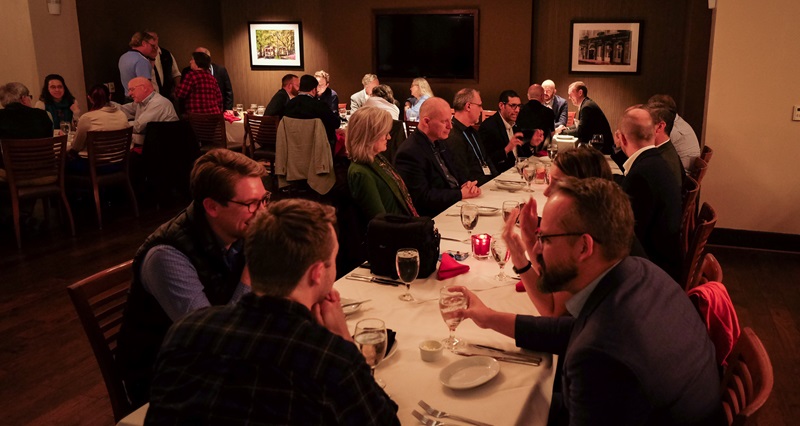Adapted from liturgy and address at a gathering of our Scripture Collective.
By Craig G. Bartholomew, 11 February 2021.
The Coronavirus pandemic thrust our world into a major crisis. At its height, between 8,000 and 13,000 people died daily around the world, with every death one too many.
KLC became independent and set out on its journey amidst this crisis. Was this folly or wisdom? While it has not been easy, the journey has been graced in too many ways to recount, from quickly finding a home at Margaret Beaufort and then again at Chesterton Mill, to the coming together of an amazing staff team, to the emergence of a wonderful group of Trustees, to the growth of an amazing community of Christian scholars. Psalm 52 contains these lines: “I will proclaim that your name is good, in the presence of your friends.” God has many names but I like this one: GOOD. And amidst many challenges this has been our experience: God is good, and again and again we have tasted and savoured that goodness.
Amidst launching KLC I have often had in mind that great African theologian, Augustine. He wrote his epochal City of God amidst the collapse of Rome, and it has never been out of print since. How is that possible? Because, although, as Paul puts it in Romans 8:20, the creation has been subject to futility, it is not without hope. There is a certain sense – I say this carefully – in which faith is made for times of crisis. Certainly, this is true of hope. This does not for a moment make a crisis such as ours easy but it does make it somewhat less than completely overwhelming.
But where, you may ask, is hope to be found? Only in this God who has come to us in Jesus and sends his Spirit to us again and again. In this strange time, it has been too easy to find ourselves in Psalm 73: “But as for me, my feet had almost slipped. I nearly lost my foothold.” At least one translation speaks in v. 17 of “until I pierced the mystery.”
We often need to pierce the mystery of the days with which we are faced. By this I do not mean having a rational explanation of it, but of finding our foothold again in Christ, so that we can look reality in the eye but with hope and compassion. This is what Wendell Berry so eloquently calls “difficult hope.”
And it is in that spirit that we move forward as KLC. Much of what is going on may be a veritable cloud of unknowing, but we hold to the fact that God’s name is GOOD, and that he is at work – whether in the midst of a pandemic or the many troubling global issues that have emerged in its wake. Indeed, the pandemic exposed the cracks in our cultures – cracks that have only widened – and the desperate need for healthy, embodied public theology to offer ways forward. This is not a time to snooze, but a time for the church to awake, and to recommit itself to being for God and thus, as Dietrich Bonhoeffer would remind us, for his world. And, as Esther 4:12-14 reminds us, for such a time as this. We at KLC want to be a part of such a movement, carrying the Christ light into the world where it is so desperately needed in so many ways. To begin to do this, two requirements move to the fore:
This backs us neatly into our vision for KLC, namely:
To nurture Christian research across the disciplines oriented towards the question “How then should we live?” This will be done in community rooted in deep Christian spirituality.

Public Theology is a crucial discipline because it enables us to foreground the inter-disciplinary dimensions of ethics and to create space for such work, always oriented to the ethical question: How then shall we live? Working in this area I have come to see that theological ethics or public theology, far from being a marginal discipline, is really the culmination of Christian insight from across the disciplines.
The niche that KLC aims to fill is that of high-level Christian research across the disciplines oriented towards how then shall we live? In the whole of Europe and the UK there are very few places where such work is pursued. North America is much better served, but even there, certainly in the Protestant world, there are very few Christian research universities.
Does research really matter? In times of crisis, isn’t it more important to be focusing on the practical matters of prayer, caring for our neighbours, helping out at food banks, and so on? Of course, but this is a false dichotomy. We need both. I remind you that Augustine’s response to the fall of Rome was to write a very fat book. Practice that is uninformed by hard thought will be thin and distorted. Research that does not listen to practice and re-enter lived experience will also be distorted. An important insight for KLC that emerged from dialogue among our Trustees is that we must appoint Academic Fellows and Professional Fellows, so that we embody a dialogue between theory and praxis, and back again. Practitioners keen to live coram deo will welcome such dialogue, as will academics keen to do their work coram deo. We also recognise that any renewal of the Christian tradition will need to be accompanied by a riot of song, dance, poetry, healthy homes, good schools, art, music, financial institutions, law offices, medical practices, etc. Only in this way will our work be contained within a plausibility structure such that it must be attended to.
The task upon us is huge. However, I see it – and I encourage us to see it – as an invitation. My sense has been that God has opened to us a wide door for effective service, and we are keen, with your help, to enter through that door.
For our Associate Fellows, we do not just want your name associated with us, grateful as we are for that, but also that you are connected with our work in some way and that we are a service to you too. Those chapters in books or journals that have largely been forgotten, those unpublished papers, let us work with you to give them new life and to hand them on to generations to come. Where important books have gone out of print, let’s revive them. As appropriate, we want you to be a part of our community.
We are deeply committed to institutional health at all levels, seeking to build a community that is humble, hungry in the sense of appropriately ambitious, and gloriously human and relational. Many good things have taken shape and we are undergoing steady growth and development. We have clusters of scholars meeting in our hubs and seminars, contracts with leading publishers, and a whole range of strategic partnerships. As you reflect on where and how you might connect with KLC, explore our website and consider these action points:

Our world needs far more of Christ, not more of us. But, if we accompany the Spirit on the mission Dei, he is well able to take our loaves and fishes, meagre as they may be, break them, and feed the hungry, the poor and those in need.
Veni Creator Spiritus.